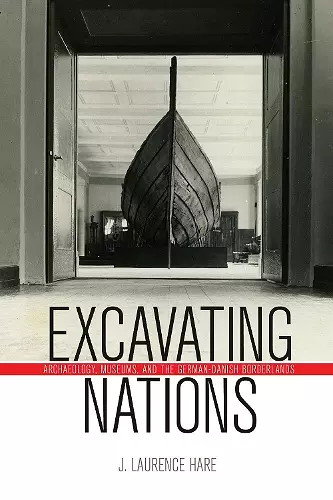Excavating Nations
Archaeology, Museums, and the German-Danish Borderlands
Format:Hardback
Publisher:University of Toronto Press
Published:27th Feb '15
Currently unavailable, and unfortunately no date known when it will be back

"Laurence Hare's fascinating study sheds new light on the uses (and abuses) of archaeology in constructing modern German and Danish national identity. In contrast to much recent scholarship on 'national indifference' in the Central European borderlands, Hare shows us that nineteenth-century German-Danish collaborations in excavating and commemorating medieval archaeological sites, such as Schleswig-Holstein's Danevirke, abetted the creation of distinct national(ist) traditions on both sides of the border. Although German and Danish archaeologists genuinely worked to foster a sense of transnational academic community committed to the mutual preservation of Nordic history and culture, their competing research agendas helped produce the racialist conceptions of empire used to justify Nazi expansion in the Second World War." -- Eric Kurlander, Department of History, Stetson University "Excavating Nations tells the fascinating story of archaeology in the German-Danish borderlands, the site of some of the most significant archaeological finds of the nineteenth and early twentieth centuries and the locus of an ongoing rivalry between Germans and Danes over the contested territories of Schleswig and Holstein. Hare shows that even in an era of accelerating nationalisms, archaeology in this region was never merely a national project, it was also grounded in local identities and material realities, shared commitments to academic norms, and often surprising levels of cooperation among scholars across boundaries of language, ethnicity, and politics." -- George Williamson, Department of History, Florida State University
Excavating Nations traces the history of archaeology and museums in the contested German-Danish borderlands from the emergence of antiquarianism in the early nineteenth-century to German-Danish reconciliation after the Second World War.
Excavating Nations traces the history of archaeology and museums in the contested German-Danish borderlands from the emergence of antiquarianism in the early nineteenth-century to German-Danish reconciliation after the Second World War. J. Laurence Hare reveals how the border regions of Schleswig-Holstein and Sønderjylland were critical both to the emergence of professional prehistoric archaeology and to conceptions of German and Scandinavian origins.
At the center of this process, Hare argues, was a cohort of amateur antiquarians and archaeologists who collaborated across the border to investigate the ancient past but were also complicit in its appropriation for nationalist ends. Excavating Nations follows the development of this cross-border network over four generations, through the unification of Germany and two world wars. Using correspondence and site reports from museum, university, and state archives across Germany and Denmark, Hare shows how these scholars negotiated their simultaneous involvement in nation-building projects and in a transnational academic community.
‘Excavating Nations is a fascinating and deeply relevant study of how political climates, ideological movements, and historical claims affected the archaeological discipline from its inception… It provides a rich context and background for our continued fascination with material remains.’
-- Karin Sanders * Scandinavian Studies vol 87:04:20ISBN: 9781442648432
Dimensions: 235mm x 161mm x 25mm
Weight: 570g
264 pages